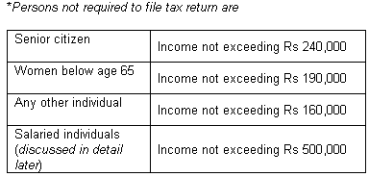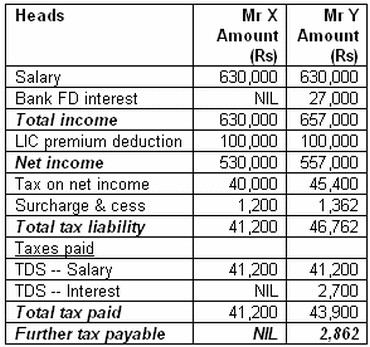When it comes to filing of income tax return, the most common views that we encounter as tax experts are thus:
- My employer has deducted tax at source on the salary income received by me hence I don't need to file my income tax returns!
- Government has stated that individuals who earn below5 lakh income need not file income tax returns!
- I work hard & hardly find time. When spending time with family is rare, why waste time on filing income tax returns.
- The deadline for filing tax returns is far away, why bother now!
- I have anyway missed the deadline for filing tax returns (July 31), so now it does not matter whether I file the returns or not!
Though these are the very popular views people have, the truth is much different. Technically any person* who has total income in excess of the threshold exemption limit is mandatorily required to file her/his income tax return.
Here are six reasons why you must file your income tax returns
1. Early bird gets the best
In case you are of the opinion that the last date for filing, that is, July 31 is a far call now and you could afford to rest, beware. It's always best to finish of this chore at the earliest so that you do not get into the crosshairs of the last minute rush filers and make a mess of the tax return.
Begin your preparations and execute your return filing process as soon as possible.
2. A stitch in time saves nine
Even if you have missed the July 31 deadline, you can go ahead & file your tax return immediately without any further delay. Penal interest is applicable for delayed filing, ONLY IF you have any pending tax liability.
Suppose your entire tax liability has been paid up before March 31, 2011 then there is no penal interest liability for you to take care of at the time of filing your returns.
In case there is any pending tax liability as on March 31, 2011 then the penal interest increases with each month of delay in filing your tax returns.
3. Fail to file and pay the price
In case you fail to file your tax returns at least before March 31, 2012, you may be liable to pay a penalty of5,000.
Also, tax returns are subject to time barring provisions, that is, currently you cannot file tax returns for any years preceding financial year 2009-10.
Hence it becomes pertinent you start filing tax returns immediately.
4. Create history, file tax returns
When you file your tax returns every year, you manage to create your financial record with the tax department.
This financial / tax history is positively viewed and favourably used by most agencies with whom you may need to interact, such as when you avail any kind of loan (home, personal, vehicle loan, etc), when you apply for VISA etc.
5. Proof of (financial) life
Income tax return is essential for making any investment and goes to prove that you have a valid source of income to make such investment.
6. New rule, added confusion
The tax department has notified that individuals with salary income below5 lakh are not required to file their tax return subject to certain conditions* being met. Though this move would benefit the new entrants to employment, for others this rule is nothing but increased confusion in deciding whether to file tax return or not.
*Conditions for exemption from filing tax return under5 lakh rule
1. Single employer income
2. Savings account interest up to10,000
3. PAN should be correctly declared to the employer
4. Employer should have deducted tax on both salary & savings account interest
Accordingly, an individual who has income from multiple employers OR FD / term deposit interest OR house, wherein she/he is claiming interest deduction would need to file her/his tax return.
Considering the above pointers, filing your tax return seems to be a GOOD IDEA rather than saying, filing tax returns? NO IDEA.
Why you must declare interest income while filing income tax returns
It's that time of the year when you have started preparing for the biggest event of the year. The event that brings painful memories of all the taxes that were taken away from you in the form of TDS (tax deducted at source) from your salary and other income such as interest from bank etc.
Most of us assume that our pain ends with the TDS. However, that is just the beginning of a journey that would culminate only with the filing of our income tax return, wherein we complete two tasks
- Declare all income earned during the previous year
- Pay up the entire tax liability
Declaring the entire earned during the previous year means that you are informing the income tax department (ITD) of the actual amount earned under various heads such as salary, interest, house rent, capital gain / loss etc.
Paying the entire tax liability means that you pay your total tax dues in any of the following ways namely, TDS, advance tax or self-assessment tax.
General presumption is that, if TDS has been recovered, then there is no further tax liability that needs to be paid to the ITD. However, this is only partly true, let's take an example to understand this.
In the table here, we have examined two situations, wherein Mr X & Y have the same salary income except that Mr Y additionally has interest income of27,000.
Here, though the bank has recovered TDS on the interest, Mr Y has to pay balance tax of2,862. The reason for this is that the bank has recovered tax @ 10 per cent of the interest amount but as Mr Y also has salary income, he is in the higher tax slab, that is, of 20 per cent hence there is a gap in tax paid by him.
Having understood this, it is pertinent for you to comprehend the effect of not declaring such interest income to the tax authorities.
1. Re-assessment
The Income Tax Officer (ITO) has the power to re-assess / reopen cases where she/he believes that income has escaped assessment. Such power is vested with the ITO up to 7 years from the end of the financial year subject to certain income criteria.
What this means: To you, this means that even if you have not included certain income in a particular year, the ITO could possibly re-open your case & get you to pay the tax on the same in any future years.
2. Penal interest
In case the tax has been short paid, you may be liable to pay penal interest on two counts. First, on account of default in payment of taxes (section 234B) and secondly on account of deferment in payment of taxes (section 234C).
What this means: To you, this would mean large outflow of money over and above the tax required to be paid as the interest on pending tax dues is charged at 1 per cent per month.
3. Penalty
The ITO is empowered to levy a penalty on you, if any concealment of income case is proved against you.
What this means: To you, this would mean a very large outflow, which could be up to 3 times the tax that was evaded by such concealment of income.
Considering the above points, it is better safe than worry & accordingly not only file your income tax returns but also declare interest income and relax.




 CAclubindia
CAclubindia
